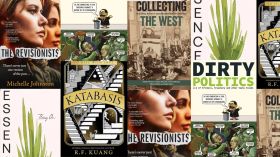Image: shutterstock.com
Returning to study is a big decision. Here are five questions to help you decide if now is the time to enrol and what course to choose.
1. Are you passionate about the subject?
For Tristan McLindon, his first experience of university wasn’t exactly what he thought it would be. After finding himself at the campus pub more than the lectures he decided the politics and journalism degree he was enrolled in wasn’t for him. He spent the next four years working in media before returning to study a Bachelor of Communications at Griffith University through Open Universities Australia (OUA).
‘I headed back to uni when I knew exactly what it was that I wanted to study,’ he said.
Knowing what he was passionate about and working with OUA helped McLindon find the right course.
‘OUA were great in helping me select the best course for me to continue with. As I had started a Bachelor in Politics and Journalism on campus I wanted to continue with writing subjects but in a more film and creative field. They helped me select the Bachelor of Communication and were always on hand at the start of each Study Period to make sure I was selecting the right subjects for my Screen Studies and Creative Writing majors.’
‘When I returned it was a more conscious decision. and it had been a few years in the making so I knew it was definitely what I wanted to be doing. I wanted to learn as much as I could,’ he said.

Tristan McLindon returned to study to follow his interest in creative writing and film. Image supplied.
2. How much time can you dedicate to your studies?
When deciding whether you should return to university, or perhaps just start your first degree later in life, a major consideration is time.
A big question McLindon had to ask himself was how he could balance study with full time work. He chose to study online for the flexibility it offered and found that he could manage his study load each semester.
‘Each study period changed from doing one subject or three subjects, depending on what I had coming up. It was about trying to find that balance between studying and other commitments,’ he said.
‘I had friends who started studying online and once I know that because I was working pretty much full time, dropping that and going back to study on campus would have been difficult. But once I saw friends go through the OUA system who had a great experience, I thought I would give it a crack and it has paid off.’
3. Will the university support you?
Whether you are deciding to study online or on campus, every student should identify what support networks are available.
‘The student support team [at OUA] was great. They went through all the units I had done, told me which ones I had left to do, and enrolled me into those. OUA were great for that,’ said McLindon.
4. What are your career aspirations and will this course help you get there?
With OUA offering over 150 online degrees from 10 leading Australian universities, it can be hard to know which is right for you. McLindon said he chose to study a Bachelor of Communication with Griffith University because it aligned with his interests and now he is starting his own production company that specialises in corporate videos and online content.
‘I majored in Screen Studies, so a lot of it was about the history of Hollywood and the great filmmakers. Then for the creative writing part I mostly focussed on screen writing.
‘I had completed a couple of technical short courses in the States a few years ago. That has always been a strong passion of mine and I’m largely self-taught, but the Bachelor of Communications helped a lot with fine tuning creative ideas, concepts, and the writing process.’
McLindon’s advice to prospective students is to first identify your individual career aspirations, which will help you choose the right course.
5. Can you get any credit from previous study or work experience?
It’s always a good idea to ask if you can get any credit to go towards the degree. This could save you both money and time in the long run.
McLindon was able to receive credits from previous study as well as professional work experience. ‘OUA were helpful in this process however in directing me to the right people to speak to at Griffith,’ he said.
To find out more about OUA visit open.edu.au






